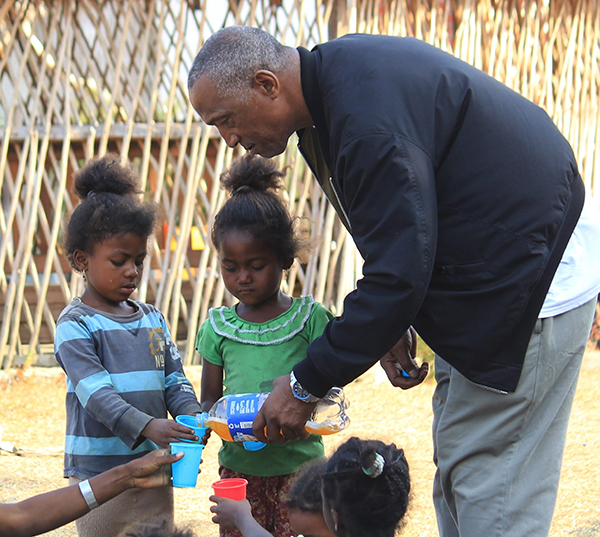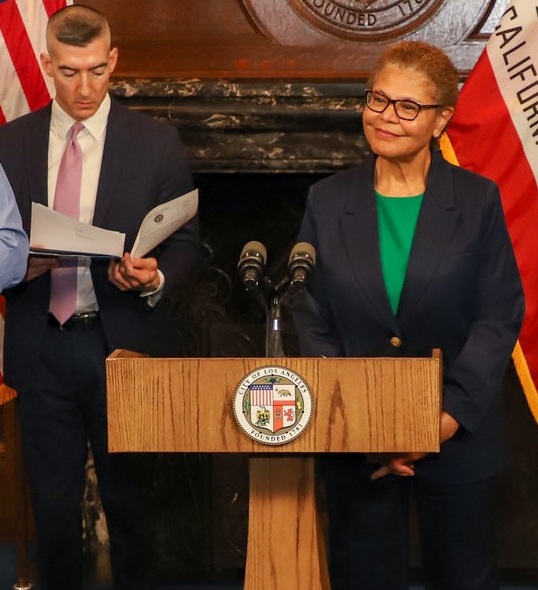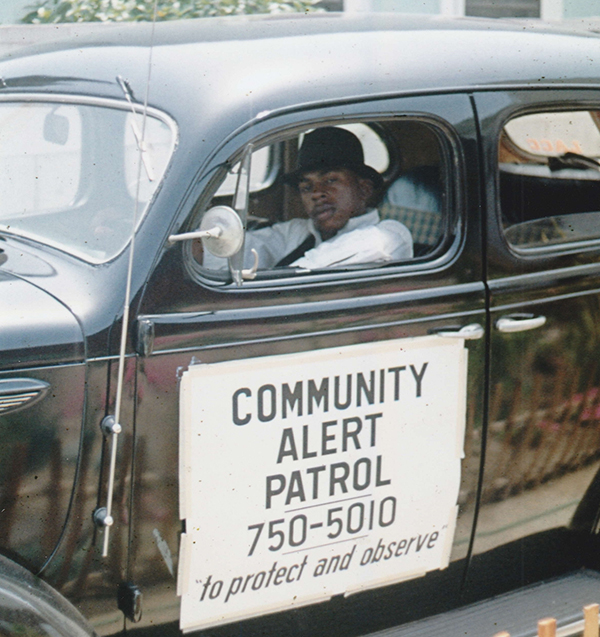By Shirley Hawkins
Contributing Writer
LOS ANGELES — Michael J. Christopher has made it his mission to eradicate hunger and illiteracy among children around the world.
A globe-trotting philanthropist, cinematographer and student of African-American history, Christopher recently spent 30 days in Madagascar, one of the poorest countries in Africa, where he and volunteers prepared food for hundreds of children and distributed school supplies.
“During the trip, I visited the English Learning Center in Fort Dauphin, Madagascar, where I helped the children learn proper pronunciations of English words,” Christopher said. “Then we traveled to a rural area where the children hadn’t eaten in three or four days.
“For several days, volunteers and I prepared meals for them that consisted of rice, meat and vegetables,” he said. ‘Hundreds of barefoot children eagerly lined up to receive the food. They were very grateful to receive the meal.”
To help the students at the English Learning Center, Christopher plans to teach an English translation class to the children through Zoom.
The former cinematographer and the founder and CEO of the nonprofit Michael J. Christopher Foundation has clicked hundreds of photos for National Geographic magazine and has traveled to 87 different countries. In every country he visited, Christopher researched the history of Blacks in that part of the world.
“I found out that thousands of years ago there were Black people in Shanghai, China,” he said. “During the Tang Dynasty that ruled from 618 to 907 AD, Arab traders brought African slaves from east Africa to China.
When I lived in Jamaica, I studied the history of the Jamaican Maroons who were descendants of Africans.They freed themselves from slavery on the Jamaican colony and established communities of free Black people in the island’s mountainous interior.”
Christopher said his life changed after he witnessed the devastation caused by the massive earthquake in Port au Prince, Haiti in 2010. He was stunned to find out that thousands of residents had been left hungry and homeless and many more perished during the earthquake.
“Thousands of children became orphans overnight,” he said. He decided to dedicate his life to helping orphans and the less fortunate around the world.
In the 1970s, Christopher, whose family spoke fluent French Creole, was made aware by a cousin that Haiti is where his paternal lineage originated. Henry Christophe, the 19th century president and king of Haiti, is actually Christopher’s great-great-great-great grandfather.
“I was shocked when I found out the news,” he said.
One of the organizations that Christopher partnered with was FONCUS, a foundation of community members united to help devastated communities in Haiti after the earthquake. The partnership has resulted in the opening of two schools and the distribution of notebooks, calculators, backpacks and educational supplies that were given to the children.
“I have visited Haiti nine times over the years to work with the orphanages,” said Christopher, who partnered with several different school programs to award $200 scholarships to students at the L’église Mission Assemblée Chrétienne Unie d’Haïti.
During one of his trips to Haiti, representatives from the United Nations and the Red Cross heard about Christopher through word of mouth and asked for his help.
“They said that none of the [donated] earthquake money being sent to Haiti was reaching the victims of the earthquake,” he said. “They contacted me and I assisted them with bringing food and supplies to the orphanages.”
Another place Christopher visited was the Martin Luther King Jr. Elementary School in Oaxaca, Mexico, a city that is home to thousands of Afro-Mexicans. More than a million people in Mexico are the descendants of African slaves.
Christopher said that “the Afro-Mexicans have been trying to become recognized as a group by the Mexican government but they are being denied because they are Black,” said the philanthropist, who wrote “Black Roots in Mexico,” a book that chronicles the history of the Afro-Mexicans.
“I talked to Afro-Mexicans in the villages in Veracruz, Mexico,” he said. “I asked them if they knew anything about their history. The people shook their heads and said, ‘We don’t know.’
“I told them about Vicente Guerrero, the first Black president of Mexico who ruled the country in 1829. I also told them that there are many cities in Mexico that were named after Africans.”
Christopher also visited Australia where he visited AbSec-new Child Family and Community Peak Aborigine Corporation.
“I was told that the aborigine children in the outback in Alice Springs, Australia needed help,” he said. “The orphanages were only feeding the children macaroni and rice. I went to the local market and bought beef, chicken and salad to go along with their meal. I also brought school uniforms, school supplies and I gave out scholarships, backpacks and hygiene supplies.”
Last year, Christopher visited the Basmat Al Hayet orphanage in Cairo, Egypt, where he discussed possibilities of delivering school supplies to the orphans.
“But the pandemic shut our plans down,” he said.
His travels have inspired him to produce books, documentaries, and photo essays that document the history of Blacks all over the world.
Christopher said he feels deep sympathy for the orphans he has met all over the globe.
“When I was 11, my mother died from breast cancer and my father passed away from liver disease, so I know what it feels like to become an orphan,” he said.
He also added that four generations of his family picked cotton and cut down sugarcane on the Orange Grove plantation in Baton Rouge, Louisiana, toiling long hours under the scorching sun.
“I remember planting sugar cane on the plantation when I was 12 years old,” he said. “It was backbreaking work. When I turned 15, I left my grandmother’s home to strike out on my own.”
But he never forgot his relatives in the fields who spent countless hours picking cotton. Recalling the harsh working conditions that his family endured on the plantation is what spurred him to research and study African Americans and the history of Blacks around the world, which he shares with orphans and school children during his travels.
Christopher’s reason for helping children in impoverished countries is simple.
“I had to help. I could not get their desperate faces out of my mind,” he said.
Shirley Hawkins is a freelance reporter for Wave Newspapers. She can be reached at metropressnews@gmail.com.











